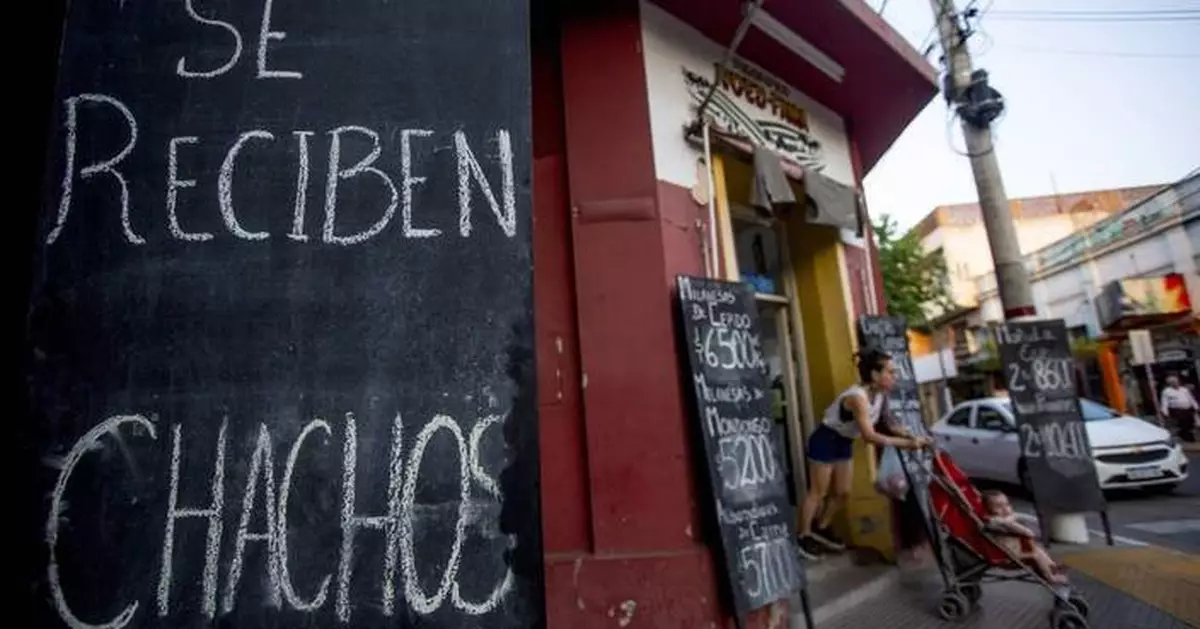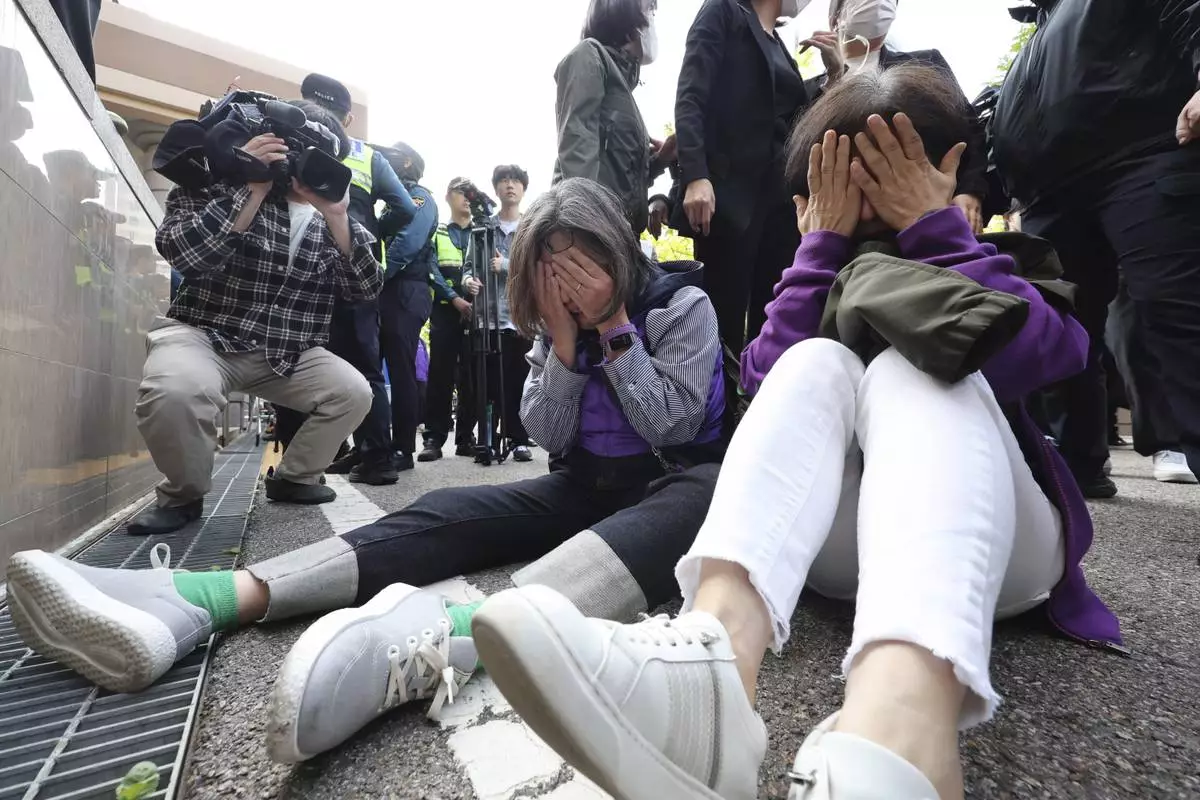LA RIOJA, Argentina (AP) — They look like cash, fit into wallets like cash and the governor promises they’ll be treated like cash.
But these brightly colored banknotes aren’t pesos, the depreciating national currency of Argentina, or U.S. dollars, everyone’s money of choice here.
They are chachos, a new emergency tender invented by the left-wing populist governor of La Rioja, a province in the country's northwest that went broke when far-right President Javier Milei slashed federal budget transfers to provinces as part of an unprecedented austerity program.
“Who would have imagined that one day I’d find myself wishing I’d gotten pesos?” said Lucia Vera, a music teacher emerging from a gymnasium packed with state workers waiting to get their monthly bonus of chachos worth 50,000 pesos (about $40).
Across La Rioja's capital, “Chachos accepted here” decals now appear on the windows of everything from chain supermarkets and gas stations to upscale restaurants and hair salons. The local government guarantees a 1-to-1 exchange rate with pesos, and accepts chachos for tax payments and utilities bills.
But there’s a catch. Chachos can’t be used outside La Rioja, and only registered businesses can swap chachos for pesos at a few government exchange points.
“I need real money,” said Adriana Parcas, a 22-year-old street vendor who pays her suppliers in pesos, after turning down two customers in a row who asked if they could buy her perfumes with chachos.
The bills bear the face of Ángel Vicente “Chacho” Peñaloza, the caudillo, or strongman, famed for defending La Rioja in a 19th-century battle against national authorities in Buenos Aires. A QR code on the banknote links to a website denouncing Milei for refusing to transfer La Rioja its fair share of federal funds.
After entering office in December 2023, Milei swiftly imposed his shock therapy in a bid to reverse decades of budget-busting populism that ran up Argentina's monumental deficits. The cuts squeezed all of Argentina’s 23 provinces but boiled over into a full-blown crisis in La Rioja, where the public payroll accounts for two-thirds of registered workers and the federal government’s redistributed taxes cover some 90% of the provincial budget.
With just 384,600 people and little industry beyond walnuts and olives, La Rioja received more discretionary federal funds than any other last year except Buenos Aires, home to 17.6 million people. Yet the province’s poverty rate tops 66% — the result, critics say, of a patronage system long used to placate interest groups at the expense of efficiency.
While Milei's reforms forced other provinces to tighten their belts and lay off thousands of employees, Governor Ricardo Quintela — an ambitious power broker in Argentina’s long-dominant Peronist movement and one of Milei’s fiercest critics — refused to absorb the strife of austerity.
“I’m not going to take food from the people of La Rioja to pay the debt that the government owes us,” Quintela told The Associated Press, portraying his chacho-printing plan as a daring stand against 10 months of crumbling wages, rising unemployment and deepening misery under Milei.
La Rioja defaulted on its debts in February and August. A New York federal judge ordered the province to pay American and British bondholders nearly $40 million in damages in September. Argentina’s Supreme Court is taking up the case of the province’s refusal to charge consumers sky-high prices for electricity after Milei’s removal of subsidies.
“There’s an alternative path to the cruelty of policies that the president is applying,” Quintela said.
He appeared confident, speaking as Milei’s approval ratings dipped below 50% for the first time since the radical economist came to power.
But as Milei and his allies tell it, Quintela’s alternative offers little more than a return to Argentina’s habitual Peronist preserve of reckless spending — and insolvency — that delivered the unmitigated crisis that his government inherited.
“You were used to having your tie fastened for you and your shoes polished, but now, you’ve got to tie the knot yourself,” Eduardo Serenellini, press secretary of Milei’s office, snapped at La Rioja business leaders on a recent visit to the province. “When you run out of cash, you run out cash.”
Serenellini picked up a chacho note, then flicked it away like lint.
Gov. Quintela’s gambit in the remote province has had little effect on Argentina’s federal finances, but that could change if more cash-trapped provinces catch on, as happened during Argentina’s terrible financial crisis of 2001, when a similarly brutal austerity scheme sent over a dozen provinces scrambling to print their own parallel currencies.
Unlike two decades ago, when former President Néstor Kirchner, a Peronist, put an end to the chaos by redeeming “patacones,” “cecacores” and “boncanfores” for pesos, President Milei has ruled out a bailout for La Rioja.
“We will not be accomplices to irresponsible people,” Milei warned in a recent interview with Argentine TV channel Todo Noticias. But the libertarian purist added that he couldn’t stop La Rioja from doing what it pleased, considering that Argentina's constitution allows for such desperate financial work-arounds.
The chacho hit the streets in August after La Rioja’s legislature approved plans to run off $22.5 billion pesos worth of the currency to help cover up to 30% of public sector salaries.
With La Rioja’s average income sinking below $200 per month and stores shuttering for lack of business, authorities doled out 8.4 billion pesos worth of the scrip in monthly bonuses in August and September, an effort to help workers cope with Argentina’s 230% annual inflation and spur the stricken local economy.
To encourage the chacho's use, authorities promise to pay interest of 17% on bills held to maturity on December 31.
“The closer we get to the expiration date, the more we’ll see public confidence in the chacho increase,” said provincial treasurer advisor Carlos Nardillo Giraud.
Most state workers interviewed in the many chacho lines spilling onto La Rioja’s sidewalks last month said they wanted to get rid of the bills as quickly as possible.
“Now the chacho is an alternative, an option for people who can’t make it to the end of the month,” said 30-year-old physics teacher Daniela Parra, mounting her boyfriend’s motorcycle with arms full of chachos, ready to spend them all in one go at the supermarket. “Who knows what will it be next month?”
On the streets, merchants said they felt locked in a catch-22.
Rejecting chachos meant turning away customers with new spending power in a deep recession. But accepting chachos meant filling cash registers with money that’s worthless to foreign suppliers and already changing hands at a discount to pesos on the street.
“They've formed a system where you're forced to depend on the state for everything,” said Juan Keulian, the director of La Rioja’s Center for Commerce and Industry. “There’s no choice in a place like this."
Follow AP's Latin America coverage at https://apnews.com/hub/latin-america

A monument to strongman Ángel Vicente “Chacho” Peñaloza, famed for defending La Rioja and other provinces in a historic 19th-century battle against national authorities, is silhouetted in La Rioja, Argentina, at dawn Friday, Sept. 13, 2024. In response to slashed federal budgets to provinces, La Rioja is printing a new emergency tender called "chachos" to pay state workers and spur the economy. (AP Photo/Natalia Diaz)
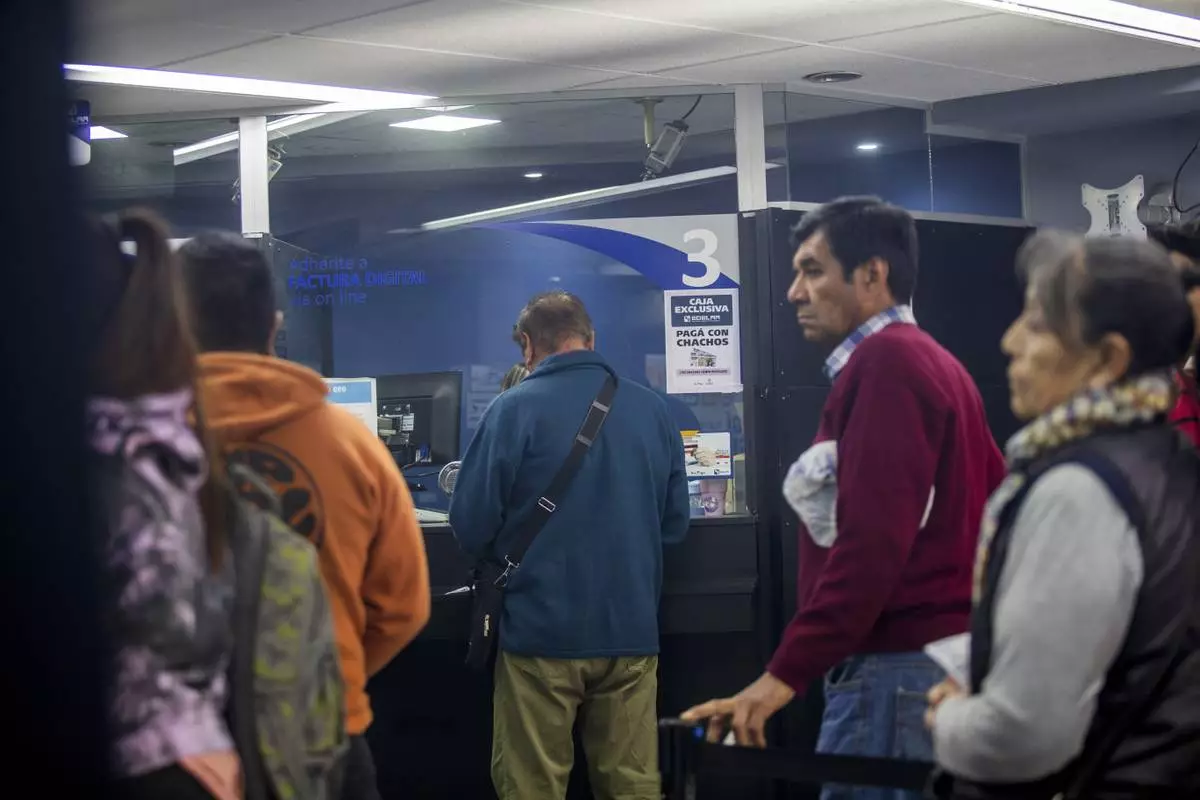
People pay their electricity bills at the electricity distribution company, using "chacho" currency in La Rioja, Argentina, Friday, Sept. 13, 2024. In response to slashed federal budgets to provinces, La Rioja is printing a new emergency tender called "chachos" to pay state workers and spur the economy. (AP Photo/Natalia Diaz)
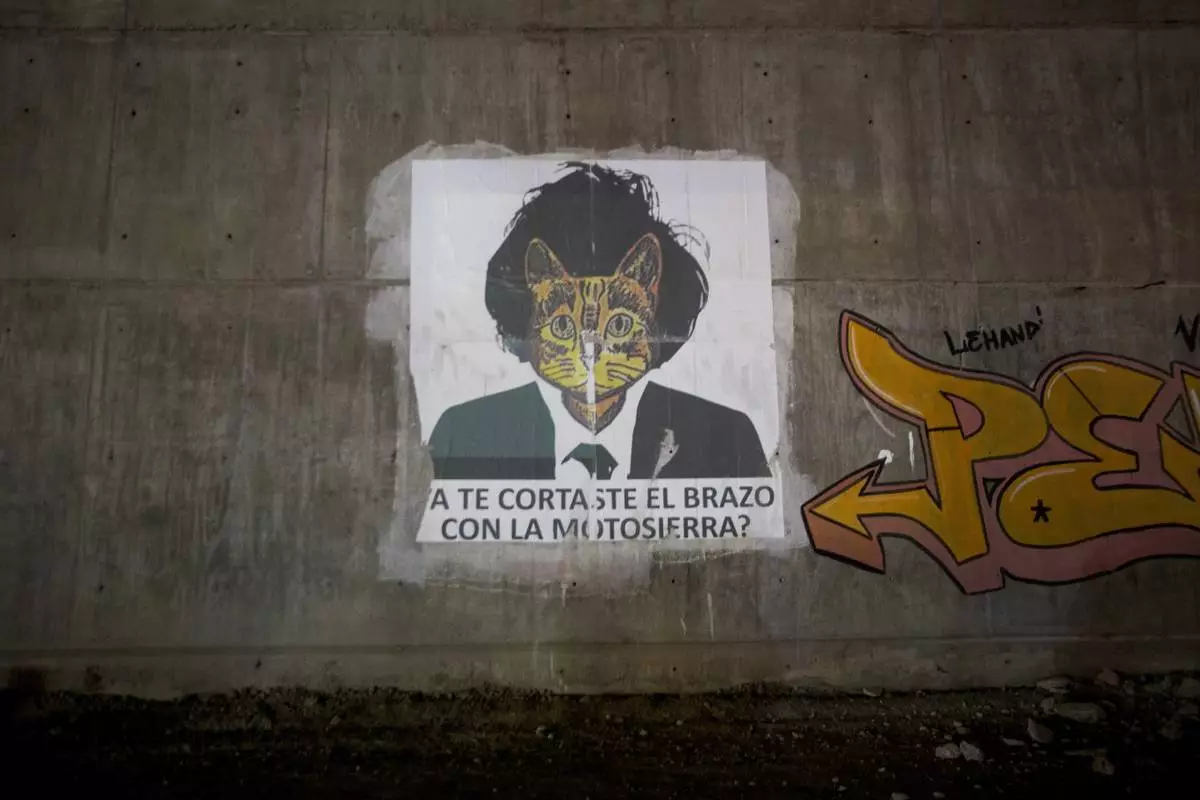
A poster critical of Argentine President Javier Milei as a cat covers hangs along a sidewalk in La Rioja, Argentina, Saturday, Sept. 14, 2024. It asks the question in Spanish: "Would you cut your arm with the chainsaw?" referring to austerity measures. In response to the government slashing federal budget transfers to provinces, La Rioja province is printing a new emergency tender called "chachos" to pay state workers and spur the economy. (AP Photo/Natalia Diaz)
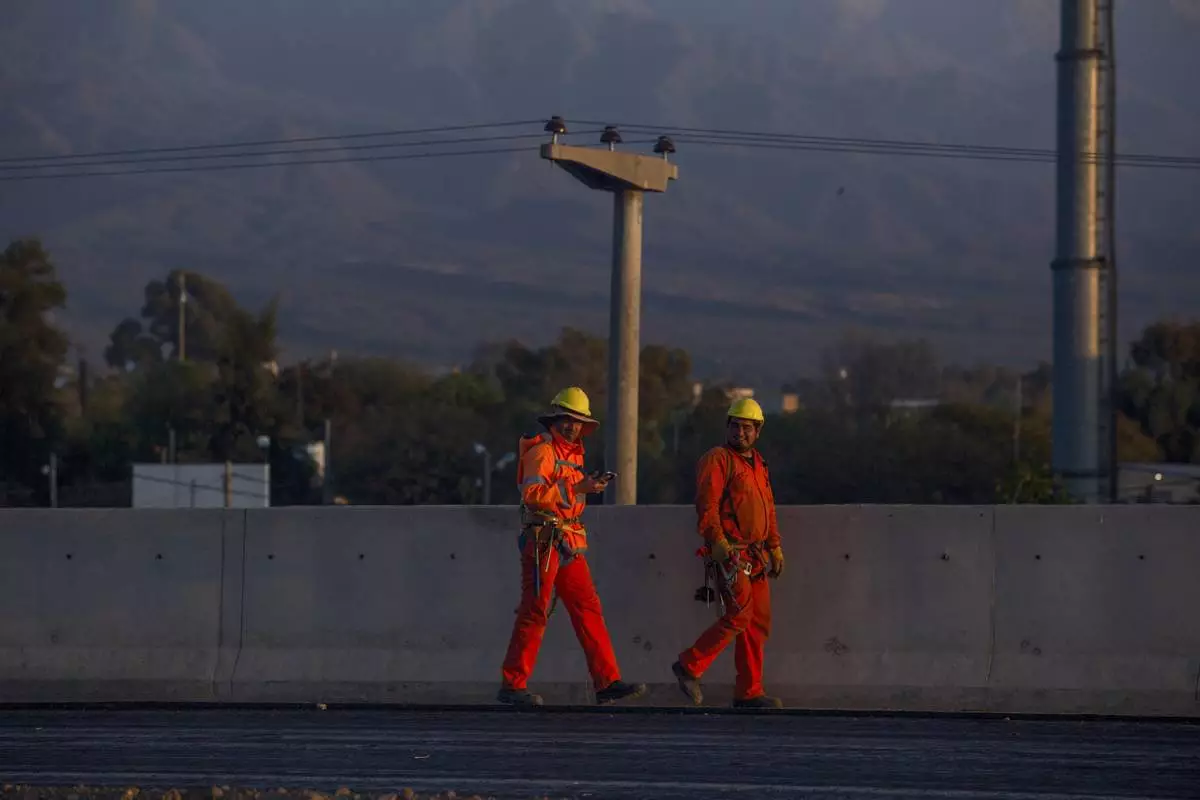
State workers head to work in La Rioja, Argentina, Friday, Sept. 13, 2024. In response to slashed federal budgets to provinces, La Rioja is printing a new emergency tender called "chachos" to pay state workers and spur the economy. (AP Photo/Natalia Diaz)
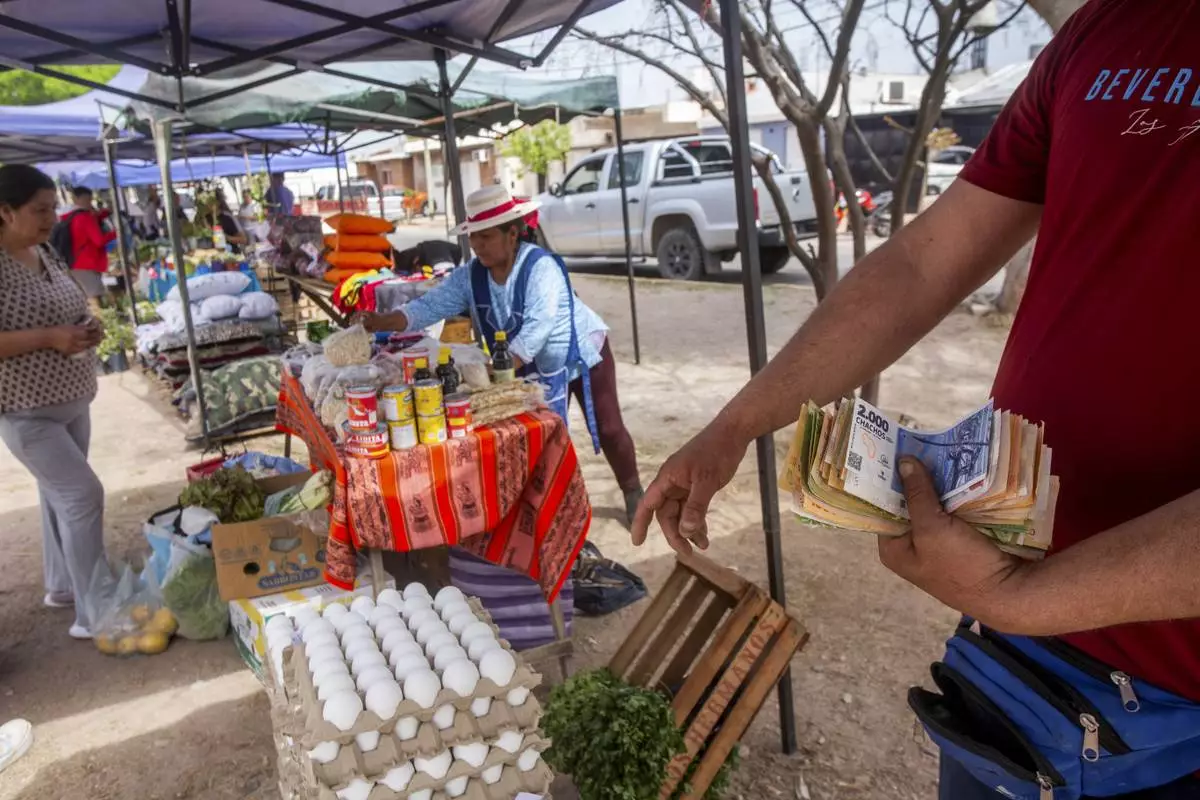
Daniel shows his cash earnings in "chacos" at the end of the day selling eggs at a market in La Rioja, Argentina, Saturday, Sept. 21, 2024. In response to slashed federal budgets to provinces, La Rioja is printing a new emergency tender called "chachos" to pay state workers and spur the economy. (AP Photo/Natalia Diaz)
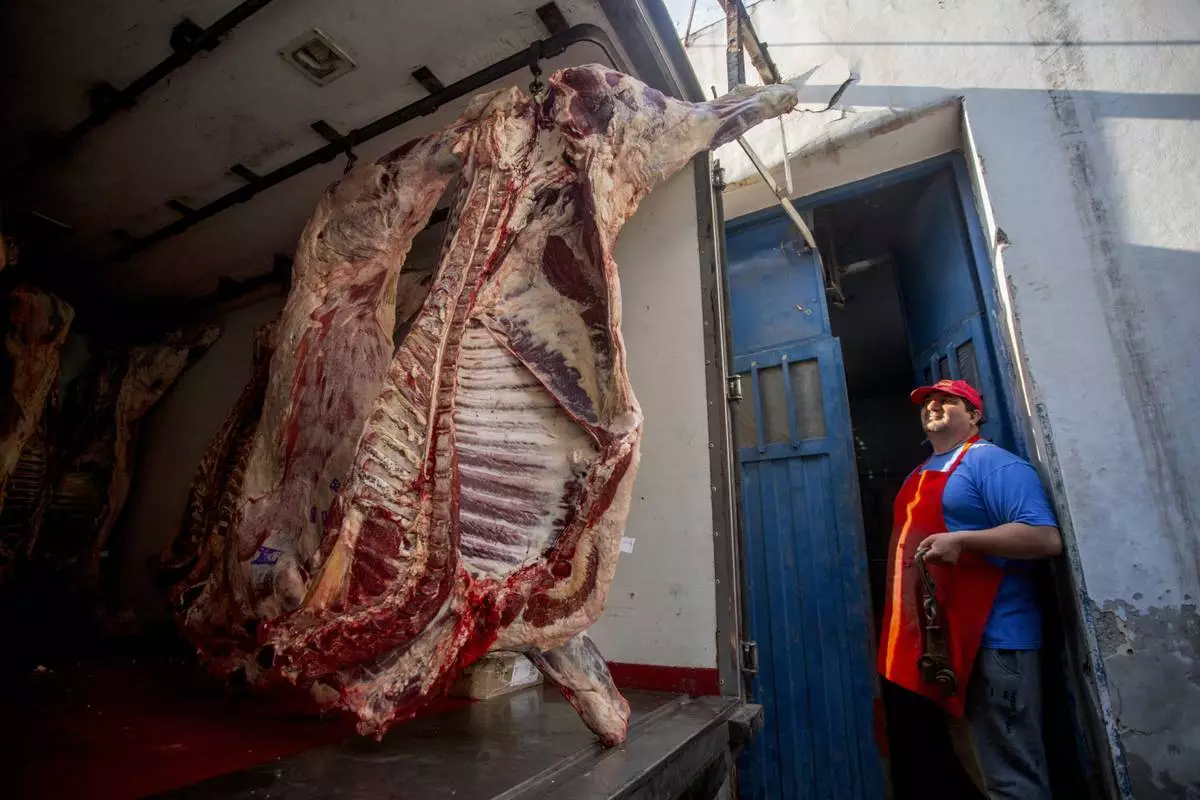
A butcher looks at fresh meat that arrived to sell at the shop where they accept "chacho" currency as payment in La Rioja, Argentina, Wednesday, Sept. 25, 2024. In response to slashed federal budgets to provinces, La Rioja is printing a new emergency tender called "chachos" to pay state workers and spur the economy. (AP Photo/Natalia Diaz)
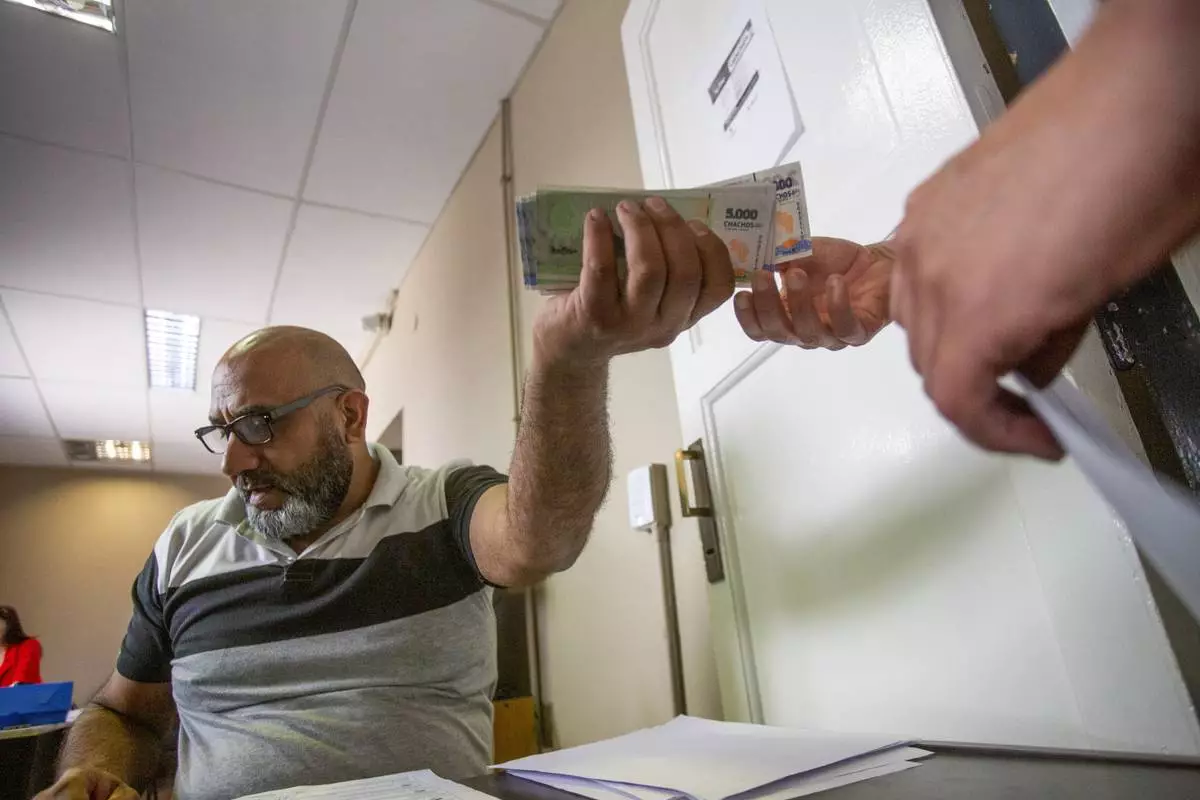
A state worker is paid with "chacho" currency in La Rioja, Argentina, Tuesday, Sept. 24, 2024. In response to slashed federal budgets to provinces, La Rioja is printing a new emergency tender called "chachos" to pay state workers and spur the economy. (AP Photo/Natalia Diaz)
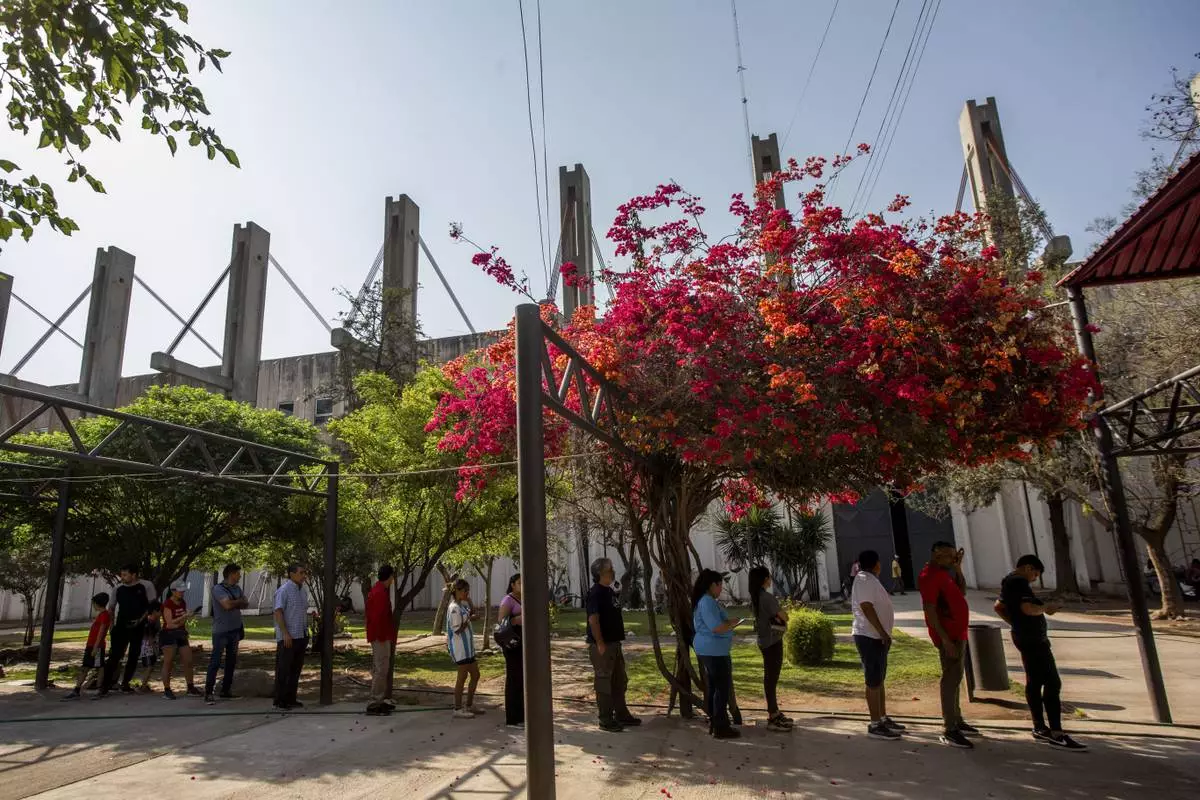
Workers wait for their paychecks in "chacos" currency outside the Polideportivo Carlos Saúl Memem in La Rioja, Argentina, Monday, Sept. 23, 2024. In response to slashed federal budgets to provinces, La Rioja is printing a new emergency tender called "chachos" to pay state workers and spur the economy. (AP Photo/Natalia Diaz)
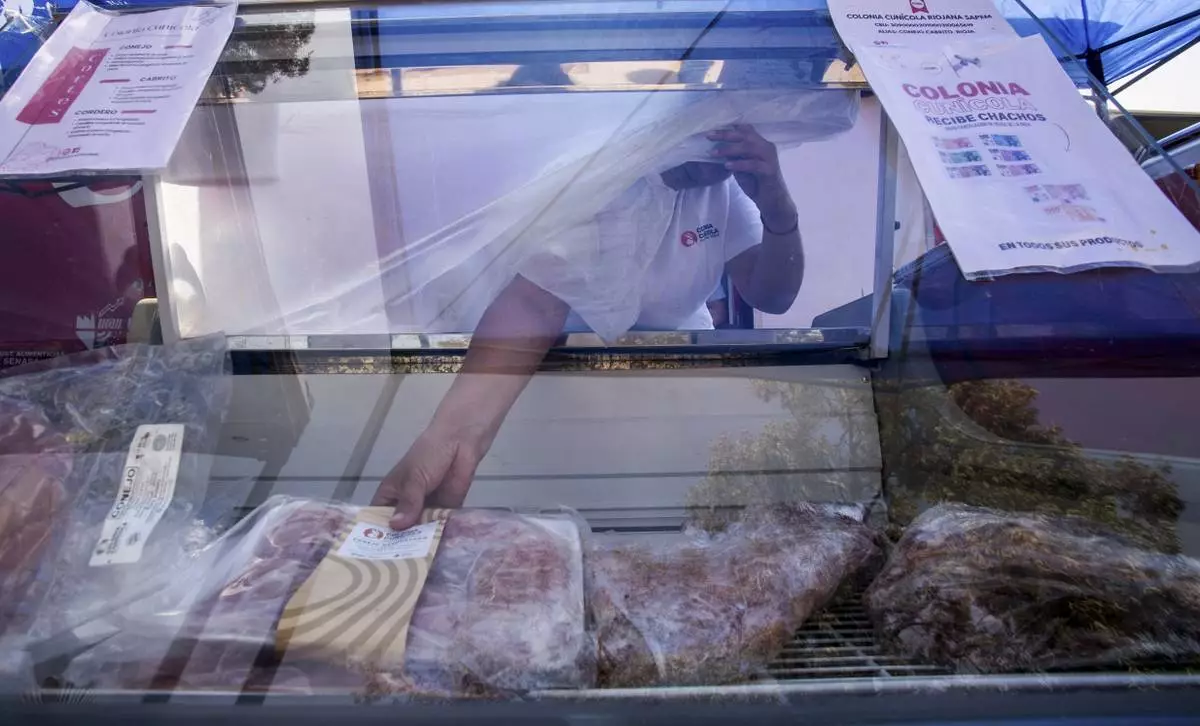
A butcher works at his stall that accepts "chacos" as payment in La Rioja, Argentina, Saturday, Sept. 21, 2024. In response to slashed federal budgets to provinces, La Rioja is printing a new emergency tender called "chachos" to pay state workers and spur the economy. (AP Photo/Natalia Diaz)

People buy groceries at a supermarket that accepts "chachos" currency in La Rioja, Argentina, Monday, Sept. 23, 2024. In response to slashed federal budgets to provinces, La Rioja is printing a new emergency tender called "chachos" to pay state workers and spur the economy. (AP Photo/Natalia Diaz)
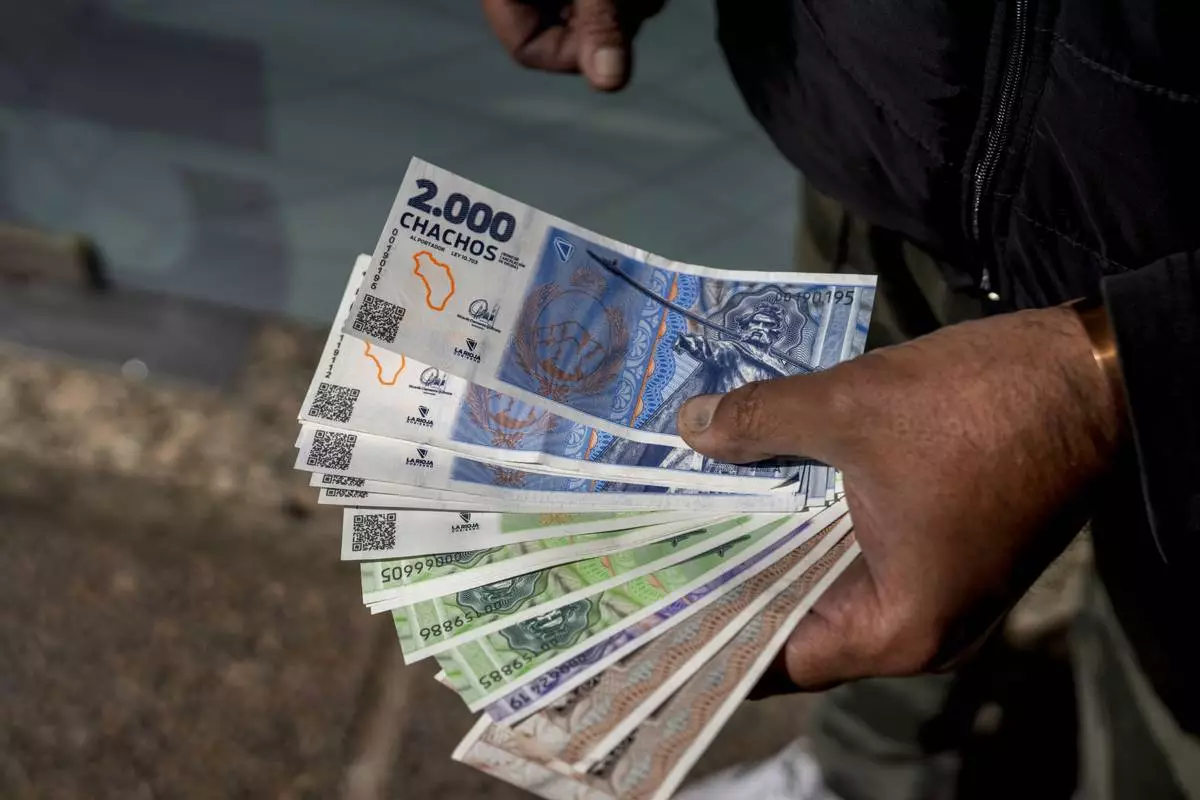
A vendor holds "chacho" currency at the Exchange Service Center to convert them to Argentine pesos in La Rioja, Argentina, Friday, Sept. 13, 2024. La Rioja province is printing this new emergency tender to pay state workers and spur the economy after the government slashed federal budgets to provinces. (AP Photo/Natalia Diaz)
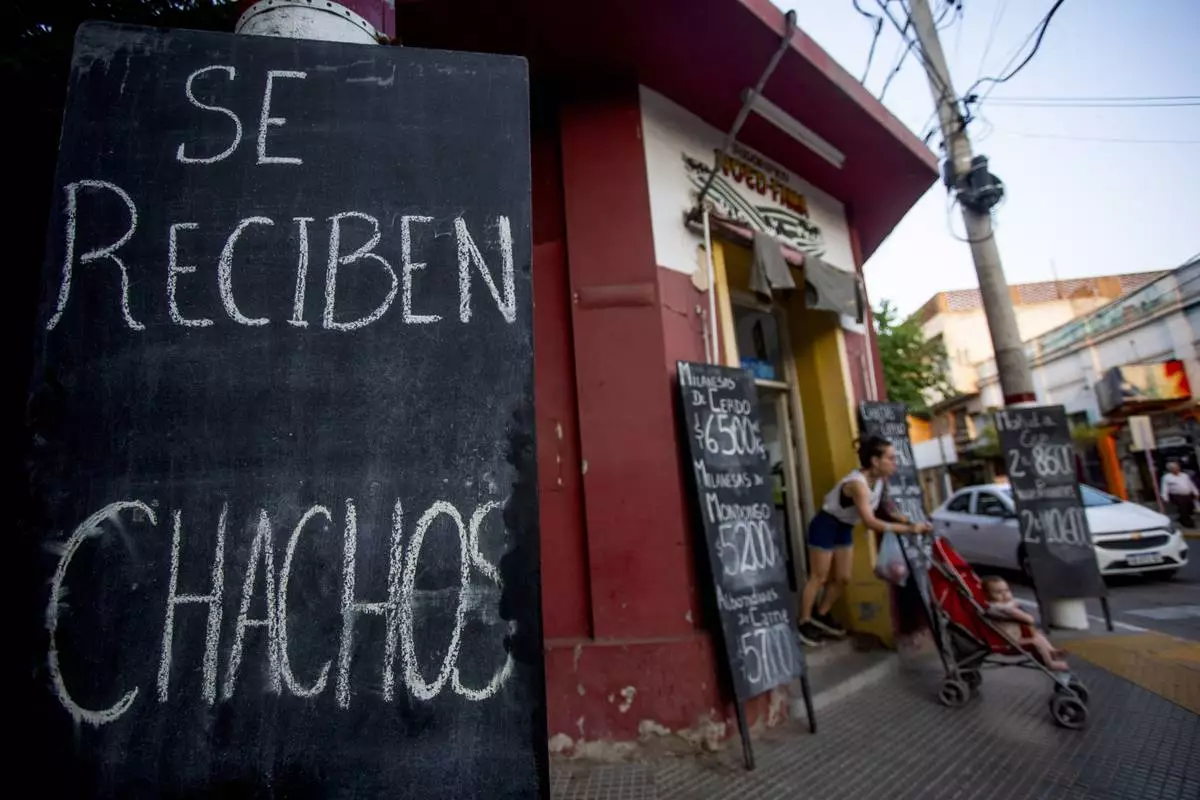
A sign reads in Spanish, "We take chachos" at a butcher shop in La Rioja, Argentina, Monday, Sept. 23, 2024. In response to slashed federal budgets to provinces, La Rioja is printing a new emergency tender called "chachos" to pay state workers and spur the economy. (AP Photo/Natalia Diaz)


